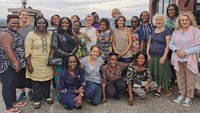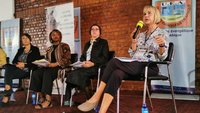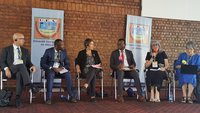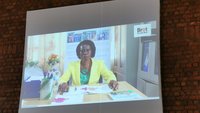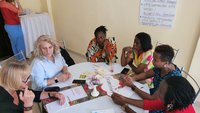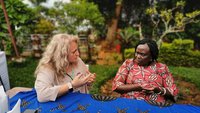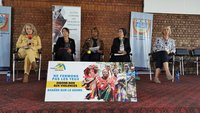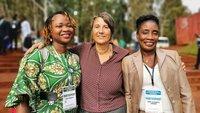Democratic Republic of Congo: Feminist networking despite regional tensions
medica mondiale took part in the Mukwege-Congress with some 20 colleagues from 13 partner organisations, including those from Liberia, Uganda, Kosovo, Bosnia and Herzegovina, Rwanda, Burundi and DR Congo. For the women’s rights activists, the trip was also an opportunity to share experiences and knowledge with each other, talking about current challenges, successes and opportunities for future cooperation.
„Society's reaction shapes the trauma of women affected by violence and influences the future of survivors.”
„Lets join forces, exchange, learn from each other and connect, and shape a joint action, which leaves no one behind and contributes to a world, in which women and girls can live with dignity and justice.”
„Until today, support to survivors of rape during genocide and their children born of war is mainly delivered through civil society organisations, and not (enough) supported by governmental mechanisms!”
Recognition and compensation: Successes and best practice
Partner organisations in Bosnia and Herzegovina and in Kosovo, with support from medica mondiale, have in the past already experienced success in gaining monthly compensation pensions from the state for women who experienced sexualised wartime violence. We chaired a panel discussion where this successful feminist work was presented to the international participants at the congress. The subsequent questions and contributions to the discussion revealed a strong interest in the issue of financial reparations, but quickly went beyond this to look for differences and similarities in the needs of survivors in differing war and post-war contexts.
„Survivors of war-related sexual violence still remain silent about their survived experience due to stigma, shame, discrimination and lack of support resources in their communities. ”
„Survivors of sexual violence should not be seen as recipients of services; they engage, lead organisations and do important outreach work. The women empower society and support each other. ”
Political tensions in the region make cooperation difficult
At the same time, the congress was overshadowed by political tensions between the DR Congo and Rwanda. The civilian population in North Kivu is facing a new outbreak of violence committed by the armed rebel group M23. Thousands of women and girls are fleeing the area to escape the threat of sexualised attacks. Increasing numbers of those affected need urgent medical and psychosocial assistance. The situation also makes conditions extremely difficult for women’s rights activists trying to continue their work.
Escalating violence is also obstructing regional cooperation and networking. Our Rwandan partner organisation SEVOTA was not able to take part in the conference in Bukavu, although it was able to attend a joint workshop in Kigali.
Together for women’s rights: Giving up is not an option
All of this makes feminist solidarity even more important. Travelling together, the full programme days at the conference, and the innumerable reflections and exchanges have once again showed us how much power and strength we have together, especially in our commitment to support survivors of sexualised wartime violence. At the same time, the violence being committed against women and girls very close to the location of the conference was a clear reminder that we cannot give up and will not give up: We are united in our struggle for women's rights. On the last day, we visited the Kigali Genocide Memorial together to lay flowers and remember the dead.
